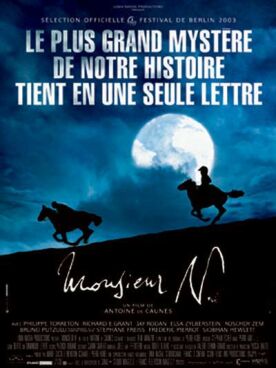Monsieur N.
In 2001, a lovely film called The Emperor’s New Clothes proposed the idea of the escape of Napoleon from St. Helena, leaving behind him a double — a drunken sailor called Eugène Lenormand — in his place. But because of a hitch in the delivery of the Emperor to a rendezvous with loyal followers in Brittany, he has to make his way back to Paris from Belgium. Adrift, therefore, from his network of secret supporters, the emperor is forced to live in disguise in the house of the widow of one of his loyal officers. Before the Grande Armée can be painstakingly re-assembled, the widow, who is charmingly played by the Danish actress Iben Hjejle, falls in love with her anonymous lodger and he with her. In the end he sees that happiness is better than honor and settles down to a comfortable life with her as a Parisian bourgeois.
Though it has a different story and lacks the lightness of touch of the earlier film, Monsieur N, directed by Antoine de Caunes from a screenplay by René Manzor, has a similar idea behind it. Once again, Napoleon the man seems to win out over Napoleon the Emperor — though the film leaves us with a degree of uncertainty about the matter at the end — as he prefers the love of a good woman to life as the ruler of Europe. Well, why not? But have you ever wondered why this kind of thing doesn’t happen more often in real life? Sometimes, it’s true, politicians resign their positions of power supposedly to “spend more time with my family.” But this has become such a cliché precisely because no one believes it. It is almost invariably a fig-leaf to cover disgrace, or defeat in an internal power struggle.
Clearly no strangers to the lust for fame, movie people ought to be especially reluctant to take such sentimentality seriously.Yet we find in practice that, however devoted to their ambitions they may be, they are terrible sentimentalists. Citizen Kane, often reckoned to be the greatest movie of all time, gets its big emotional kick from the final suggestion that, even if its great man would not himself have traded his trunksful of wealth and worldly honors for the simple happiness he knew as a poor boy, we would readily do it on his behalf. There is also a “Rosebud” moment in Monsieur N. in which Napoleon (Philippe Torreton) says to his childhood friend and fellow Corsican Cipriani (Bruno Putzulu): “How can a man who has held the whole world accept to be nothing?”
Cipriani replies by telling him that to be just a man is not nothing. “Napoleon is dead,” he says. “Now you can be Nabulio” — his name as a child in Corsica. Like one schoolgirl noticing another’s “crush,” Cipriani makes specific reference to the way the ex-dictator looks around Betsy Balcombe (Siobhan Hewlett), the daughter of an English family of the island, and we know already that Betsy is there to provide a wholesome contrast with the jealous, backbiting coterie of former officers and their wives who make up Napoleon’s entourage. Is true love possible even for the master of this snake-pit, a man who only speaks the truth when he says that “There is no love in my bed, just favors and bills of exchange.”
Though, as I say, the film doesn’t give a positive answer to this question, or even reveal for sure whether or not Napoleon escapes from St. Helena, the fact that it asks it at all makes it hard for me to take Monsieur N quite seriously. The strong hint that the Emperor ended his days keeping bees with Betsy in Baton Rouge is just a couple of steps too far in the direction of the ridiculous. There were similar absurdities in The Emperor’s New Clothes, in particular the spectacle of Napoleon applying his military genius to the marketing of melons. But that film never pretended to be anything but a fantasy. It is Monsieur N’s seriousness that makes it seem almost silly.
It also hasn’t got Ian Holm’s performance in the title role — as well as that of the double — which did so much to make The Emperor’s New Clothes such a delight. Philippe Torreton’s brooding, saturnine Napoleon is probably a lot more like the real Emperor, and not only because he speaks French — as well as the Corsican dialect with Cipriani. For Monsieur N. also makes his character more interesting in itself, and M. Manzor’s script is good at conveying the swooping, intuitive intelligence of the man who casually throws off insights, paradoxes, witticisms and epigrams like: “History is a lie that no one questions,” or “A man who escapes admits he’s a prisoner.”
I especially liked the way he toys with the admiration of the young English officer, Basil Heathcote (Jay Rodan), who also loves Betsy and who subsequently takes it upon himself to investigate the mystery of Napoleon’s endgame. At one point he casually mentions an “infallible” proof that he, Napoleon, was directly descended from the Man in the Iron Mask and therefore the rightful heir of Louis XIII. Heathcote is impressed in spite of himself, but Napoleon immediately turns on him: “See? You wanted to believe me. Men will sacrifice reason to their imagination.”
Heathcote is the one wholly fictional character in the film, which generally speaking sticks closely to the facts of Napoleon’s final exile. But this just makes its one big deviation into fiction, the idea of his capitulation to the softer sentiments, seem all the more implausible. Here, in short, is a believable portrait of greatness made regrettably less believable by what (it is hinted) greatness would do if only it could.
Discover more from James Bowman
Subscribe to get the latest posts to your email.








